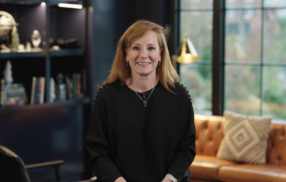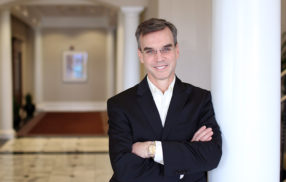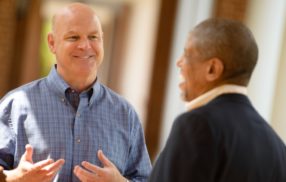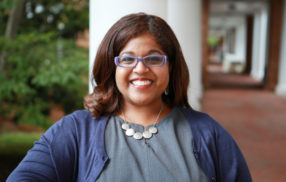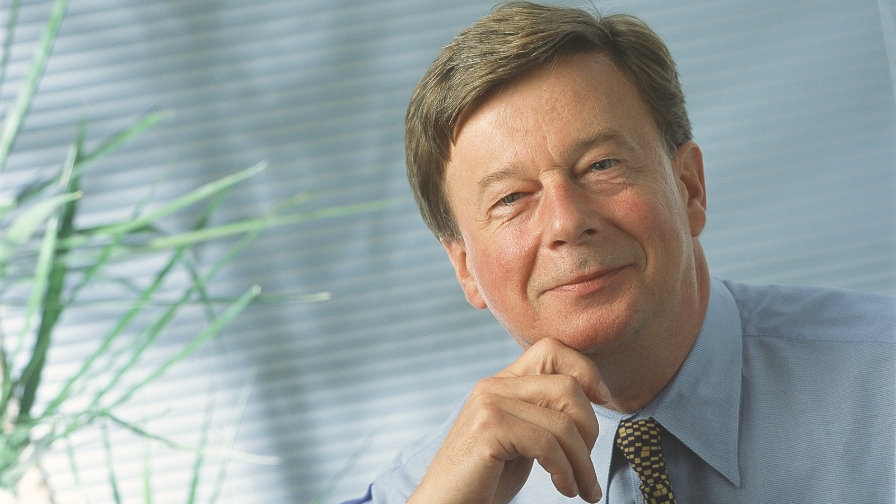
New Book Details Singular Life of Biotech Pioneer, UVA Darden Alumnus Henri Termeer
By Dave Hendrick
John Hawkins (CLAS ’76) never expected to be life sciences visionary Henri Termeer’s (MBA ’73) biographer.
In December 2016, a retired Termeer invited Hawkins — now vice chairman and board adviser at search consultancy Odgers Berndtson — to his Boston pied-a-terre, an event likely spurred by their mutual connection to the pharmaceutical giant Allergan and a series of recent recruitment successes Hawkins had managed with mentees and colleagues of Termeer. The pair had coffee and talked for nearly two hours, and Hawkins had his first extended close-up view of Termeer, a University of Virginia Darden School of Business alumnus who was mentoring more than 46 active CEOs at the time.
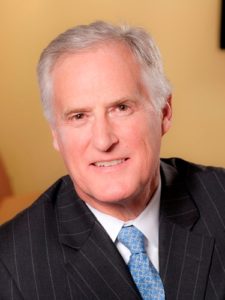
John Hawkins
“We talked and I just thought, this guy is special.” Hawkins, a UVA alumnus, said. “I found him to be a humble, warm and charismatic person, especially for a highly successful Fortune 500 CEO.”
Months later on 12 May 2017, Termeer died unexpectedly. At the ensuing memorial service on the campus of the Massachusetts Institute of Technology, where Termeer was a longtime member of the board’s executive committee, Hawkins observed guests who had come from across the world to celebrate Termeer’s life and work. He listened as six eulogists, from a Nobel Laureate to Termeer’s 16-year-old daughter, praised the life-saving, visionary work of a man credited with co-fathering the modern biotech industry and pioneering the so-called orphan drug industry. Also called the rare-disease industry, Hawkins said the space is now a $130 billion global industry. In 1983, when Termeer joined Genzyme as its 17th employee, it did not exist.
At the time of his death, Termeer was known as a generous philanthropist and trusted adviser to scores of executives and organizations. He was also credited with playing a significant role in Boston’s rise into the epicenter of global biotechnology.
Hawkins, who had long considered writing a book, decided he had found a worthy subject, a largely unsung hero who embodied unique and exemplary leadership traits — someone whose life carried lessons for anyone interested in leadership, life sciences or human character, in general. The result of the two-year project, Conscience and Courage: How Visionary CEO Henri Termeer Built a Biotech Giant and Pioneered the Rare Disease Industry, was published in October.
An edited transcript of a recent conversation with Hawkins follows:
Can you describe Termeer’s impact and influence?
Termeer was a man who improved the human condition of millions, most of whom will never know his name. The rare-disease community sounds like it would be this little corner of medicine; in fact, if you aggregate all of these genetic, inherited disorders that result in these rare diseases, it’s the largest therapeutic category in medicine, bigger than oncology, allergy and cardiovascular, to name a few.
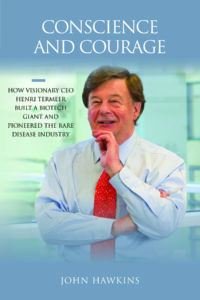
John Hawkins’ biography of Henri Termeer (MBA ’73) was published in October.
Globally speaking, the rare disease community has been estimated at half a billion people when you include patients, patient families, patient advocates and caregivers.
So when Henri joined Genzyme in 1983, ten drug products which had been FDA-approved for large-market diseases were being used off label to treat rare diseases; they just happened to work in these ten instances. But there were no products on the market or even in development that had been targeted to specifically treat rare diseases. There simply was no economic incentive for companies to do so. Back then, if a child got a rare disease diagnosis, their outlook was hopeless. Medically speaking, they were orphaned. Nothing could be done to help them.
Gaucher is a good example. Gaucher disease afflicts approximately 5,000 patients worldwide. Who was going to spend $500 million to develop a drug for Gaucher? Nobody. People thought he was absolutely crazy. So one of the things I loved about this guy, and everybody else did, too, is he took risks, but especially for the benefit of patients. He was an entrepreneur at his core. He was also all about patients. The purpose of Genzyme’s mission was, above all else, the patient.
Pushing forward with the drug to treat Gaucher is referred to in the book as one of the gutsiest calls in business history. Why?
Eight years before its FDA approval in 1991, the drug to treat Gaucher, Ceredase, was experimental and unproven. It had shown results in only one patient. And to complicate matters, one year’s supply of the drug, per patient, required the processing of 22,000 postpartum placentas; and there are only about 2,000 patients in the United States
The hurdles to developing and commercializing this drug were high and unimaginably difficult to solve. There was this massive supply issue, this massive cost and reimbursement issue, the fact that the first clinical trial wasn’t successful, and the end-market was tiny.
Every member of his scientific advisory board argued against pursuing it. So did Genzyme’s venture capital investors and the company’s chairman and founder. Henri was undeterred.
Henri had seen this little boy — the first patient, Brian Berman. This experimental drug worked for Berman.
A year and a half later, they did another trial and discovered that the seven patients who didn’t initially respond to the experimental therapy had been given the wrong dose. Initially, they had all gotten the same dose. Brian Berman was the smallest patient, and he responded to the small dose that was given; but the others didn’t. So the next time around, they were all given doses based on their body weight; they all responded. It was proven that the drug’s efficacy was dependent on body weight.
It’s hard to think there’s ever been a more gutsy or consequential decision in the annals of biotechnology. Henri was almost fired for making it.
How would you describe his leadership style?
Henri was an iconoclast. While he was laser focused on doing the right thing by patients, he was a capitalist, and he was a tough businessman. He was also an eternal optimist. But he was unconventional in the way he thought about so many things.
He was very entrepreneurial and loathed structure. He loved strategic thinking, but he didn’t like strategic planning, and he didn’t like org charts. The way Genzyme ran for the first 15 years of the business, decisions were made in less structured ways. He created a culture that encouraged people to take personal initiative and to do things, especially when their risks were being taken to benefit patients; but you were accountable for what you did.
He also was quietly fanatical about time. Urgency mattered to him, because every day that passed meant a patient was waiting for his help. He collected clocks.
Henri was a father figure in many ways. He cared deeply about not only his direct team, but those way down the ladder. He had up to 30 direct reports. He liked flat organizations. Decisions could be made more quickly and bureaucracy avoided.
Personal responsibility was very important to him. After listening to their plight and giving them his considered advice in return, he would often end his conversations with mentees: “It’s your responsibility.”
Termeer is quoted in the book describing Darden as “lots of work and lots of fun,” and he actually credits his experience at the School with his decision to permanently immigrate. What did Darden mean to him?
I think it was important. This was his first network, so he was very fond of this place. Henri was married and many people weren’t, and he was one of the few international students, so he was a little different.
It was clearly important to him. He came back to talk to students and he donated to Darden.
Termeer’s time leading Genzyme was cut short after a contamination crisis led to a $20 billion takeover from Sanofi. Do you have a sense of how Termeer viewed the fallout?
It all started in June 2009 when a contamination of his primary plant was discovered. They had to basically dismantle the site, disinfect it, and rebuild it. It was a devastating period for Henri because of product outages and the adverse impact it had on the health of Genzyme’s rare disease patients. It was so avoidable. This was a Fortune 500 company, and the plant was a single source site for two of Genzyme’s most important rare-disease products. There was no back-up site.
He didn’t shirk the responsibility or put it off on someone else. He accepted it, but it was a very tough couple of years.
And compounding the complexity of this period, the global financial crisis was unfolding, and he’s the chair of the Federal Reserve Bank of Boston during this period. The CEO of the Boston Fed, Eric Rosengren, reflected on Henri’s composure during this period. Henri’s life was being completely upended, but you never would have known it. He was able to stay in the moment, focus on the tasks at hand. Henri could compartmentalize things in ways that others could only imagine.
In the end, the plant’s operation was resumed and the contamination eliminated, but the loss of momentum and the damage done to the company was unassailable, opening the door to activist investors. Sanofi eventually entered the picture in the summer of 2010, and nine months later, their tender offer was reluctantly accepted.
For Henri, the combination provided a graceful exit, and for Sanofi, a gateway into Boston, a leading strategic position in the global rare disease industry and an accretive acquisition.
Why do you think Darden students, or future business leaders, should know Henri Termeer?
Somewhere very high on the list has to be, “It’s your responsibility,” which is what he would always say to the people he mentored. He was very much into accountability and personal responsibility.
He was also the ultimate human capitalist. He really understood the value of people and was just amazing at not only hiring but getting the best out of his people. Some environments see human talent as fungible. Henri saw it as the opposite. He was in it for the long haul with everybody.
Another aspect is that life and business are about more than money. The things he did and the way he lived were as governed by conscience and doing the right thing as they were around delivering earnings per share. He was very focused on doing the right thing. He placed patients at the center of his life’s mission.
The University of Virginia Darden School of Business prepares responsible global leaders through unparalleled transformational learning experiences. Darden’s graduate degree programs (MBA, MSBA and Ph.D.) and Executive Education & Lifelong Learning programs offered by the Darden School Foundation set the stage for a lifetime of career advancement and impact. Darden’s top-ranked faculty, renowned for teaching excellence, inspires and shapes modern business leadership worldwide through research, thought leadership and business publishing. Darden has Grounds in Charlottesville, Virginia, and the Washington, D.C., area and a global community that includes 18,000 alumni in 90 countries. Darden was established in 1955 at the University of Virginia, a top public university founded by Thomas Jefferson in 1819 in Charlottesville, Virginia.
Press Contact
Molly Mitchell
Senior Associate Director, Editorial and Media Relations
Darden School of Business
University of Virginia
MitchellM@darden.virginia.edu


